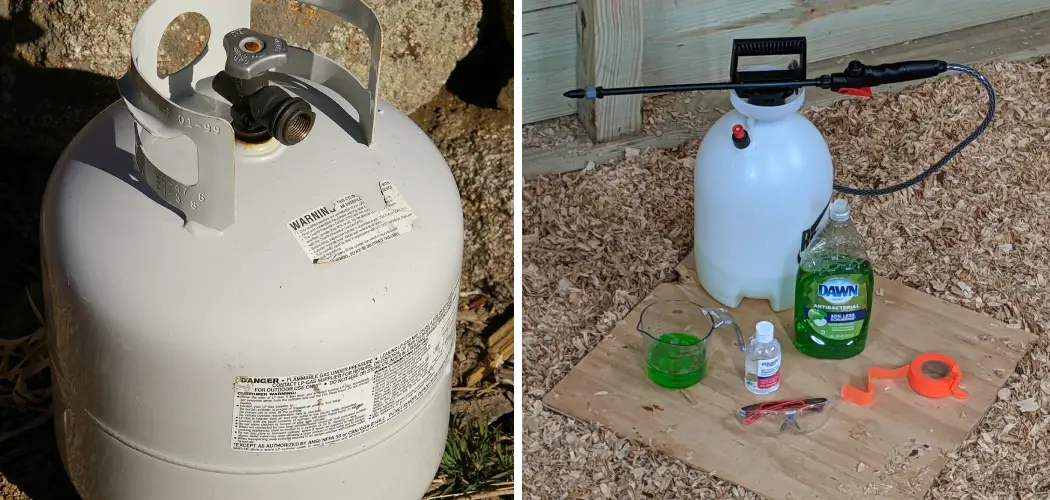Propane gas is a widely used fuel for heating homes, cooking, and powering generators. Its clean-burning and energy-efficient features make it a popular choice for families and businesses alike. However, propane is also highly combustible and can pose serious safety risks if handled improperly.
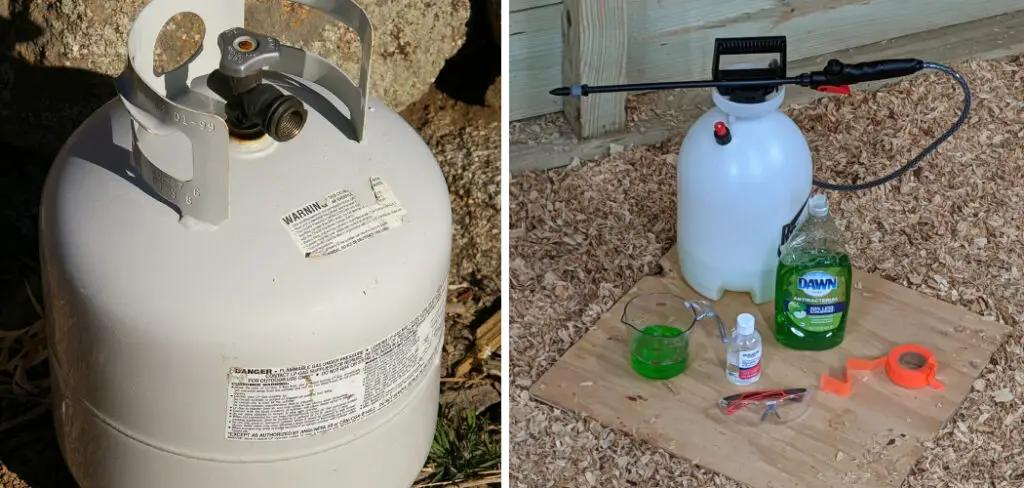
One of the most significant dangers of using propane is the risk of gas leakage, which can lead to explosions, fires, and carbon monoxide poisoning. Therefore, it is crucial to know how to know if propane is leaking and take immediate actions to prevent harm to yourself and your home.
Can You Identify if The Propane Is Leaking?
Propane gas is a popular fuel source for various types of appliances, from barbecue grills to heating systems. However, it can also be dangerous if it’s leaking. That’s why it’s important to know how to identify if the propane gas is leaking. One of the most common signs is the smell of gas. Propane has a distinct odor, often compared to rotten eggs or skunk spray.
There’s likely a leak if you smell this odor and can’t locate the source. Another sign is a hissing or whistling sound from the gas line or appliance. This can indicate a leak in the gas line or valve. It’s important to take any signs of a propane leak seriously and follow proper safety protocols to prevent accidents and injuries.
Why It’s Important to Identify if The Propane Is Leaking?
Propane is an incredibly useful and versatile gas; it fuels everything from grills to heaters, generators to stoves. However, it’s also a flammable gas, which means it’s important to know when it’s leaking to prevent dangerous situations. Leaking propane can cause fires, explosions, and even carbon monoxide poisoning, so it’s crucial to identify if the propane leaks.
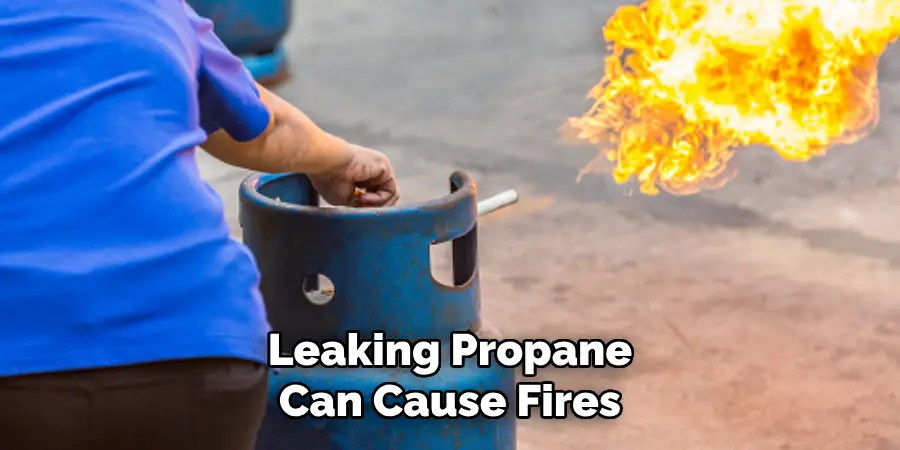
Additionally, a propane leak can lead to significant monetary losses, as propane is not a cheap resource, and any wasted propane can result in increased expenses. To maintain safety and ensure efficient use of this valuable resource, it’s essential to monitor and inspect propane tanks and systems for leaks regularly.
How to Know if Propane is Leaking: Protecting Yourself and Your Home
1. Smell the Gas
The first sign of propane leakage is its distinct odor. Propane gas is odorless on its own, but gas companies add an ethyl mercaptan that smells like rotten eggs or sulfur to help people detect leaks easily.
If you smell this distinct odor, don’t ignore it. Turn off the propane supply from the tank or cylinder immediately. Do not light any flames, use electrical appliances, or smoke in the area until it has been confirmed safe.
2. Look for Visual Signs
Another way to check for propane leakage is to look for visual cues in and around your propane-powered appliances. These include corrosion or rust on the tanks or pipes, damaged hoses, loose connections, and hissing or whistling sounds from the gas supply system.
Check for flame color as well. A yellow or red flame instead of a blue flame could indicate a propane leak or incomplete combustion and should be addressed by a professional.
3. Use a Gas Detector
If you want to ensure your propane supply is not leaking, you can use a gas detector. Several types of detectors are available in the market, including handheld, wall-mounted or remote sensors.
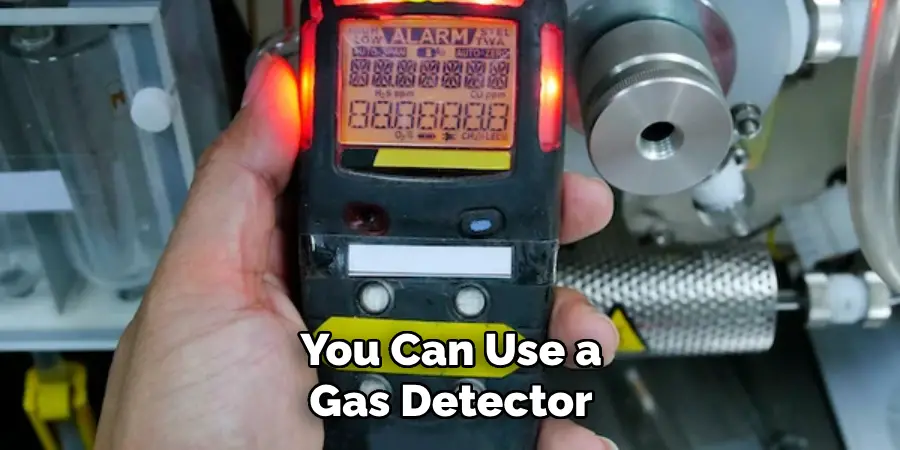
These devices detect propane leaking by sounding an alarm when gas concentrations exceed safe levels. Some detectors can also connect to your smart home devices or send alerts to your phone so that you can quickly respond to a leak.
4. Get Professional Help
Always call a certified propane service technician to inspect your propane system when in doubt. An expert can identify and correct any issues with your appliances or equipment that could lead to propane gas leakage.
Professionals can perform routine maintenance on your propane tanks, including safety checks, regulator replacement, and leak testing, to ensure optimal performance and safety. Do not attempt to fix propane system issues alone, as it can be hazardous and lead to more severe problems.
5. Take Preventative Measures
One of the best ways to avoid propane leakage is to prevent it from happening in the first place. Ensure you purchase propane cylinders or tanks from trusted suppliers and store them in safe, well-ventilated areas away from heat sources and children.
Use propane-powered equipment only for their intended purposes and follow manufacturers’ instructions and safety guidelines. Install carbon monoxide alarms throughout your home to detect gas leaks before they become deadly.
6. Have Regular Maintenance Checks
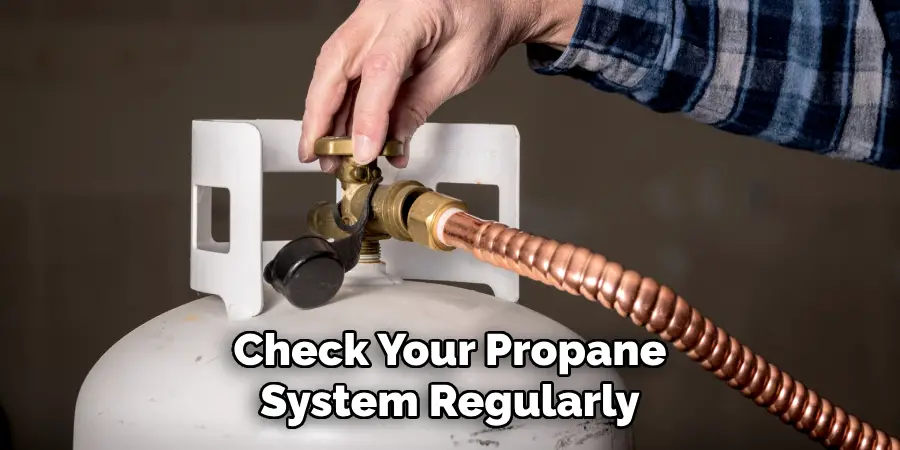
It is important to check your propane system regularly for any signs of leakage or other wear and tear that may occur over time. A certified technician should be able to detect any potential problems before they become serious. Additionally, check the pressure relief valve on your propane tank once a year and ensure it works properly. This will help prevent any dangerous buildup of pressure.
7. Invest in a Backup System
Finally, investing in a backup system can help keep you safe from propane leakage emergencies. Having an emergency shut-off valve installed near your propane appliance or tank is an invaluable precaution that can be used to quickly turn off the gas supply if necessary.
Additionally, having an oxygen detector or carbon monoxide alarm can alert you to a gas leak in its early stages so that it can be addressed immediately. By taking these precautions, you can help ensure the safety of your home and family.
These tips should help you identify potential propane leakage and keep yourself safe. However, if you ever doubt your propane system’s safety, contacting a certified professional for assistance is always best. Regular maintenance and inspections can help prevent an accident, so schedule service checks on your propane system at least once a year. Taking these steps will help you keep your home and family safe.
5 Considerations Things When You Need to Identify if Propane Is Leaking
1. Smell
Propane has a distinct smell that is often described as similar to rotten eggs. If you detect this smell in your home or around any of your propane appliances, it could indicate an indication that you have a gas leak.
2. Visual Cues
In addition to the smell, there may also be visual cues that indicate a propane leak. These can include dead patches of grass or plants near the tank, bubbles in standing water near the tank, or discolored dirt near the tank.
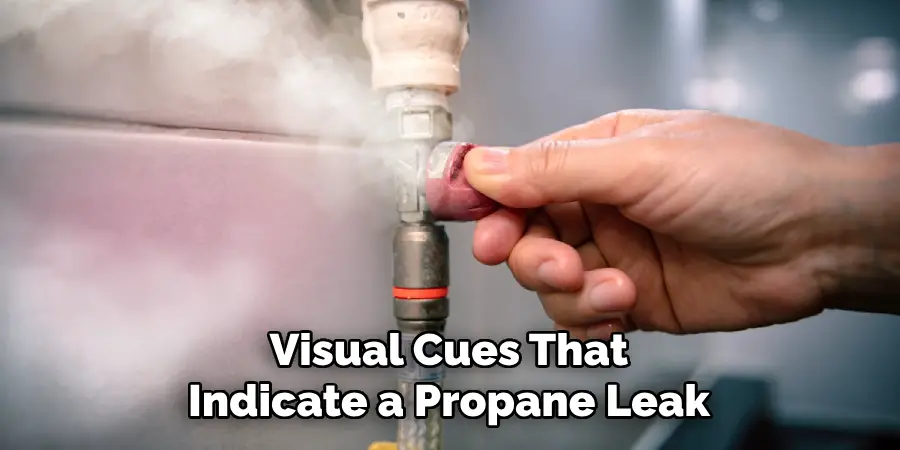
3. Listen for Hissing Sounds
If you suspect a propane leak, listen for hissing sounds coming from the tank or any of the appliances connected to it. This sound indicates that gas is escaping from somewhere and should be addressed immediately by a qualified technician.
4. Check Appliances
If you believe there is a propane leak, check all of your propane-powered appliances for signs of damage or corrosion on their exterior surfaces. This could indicate that gas is leaking from inside the appliance and needs to be repaired or replaced immediately by a qualified technician.
5. Use Test Equipment
Suppose you are still unsure whether a propane leak is present in your home, Purchase and use test equipment designed specifically for detecting leaks in propane systems. These devices are inexpensive and easy to use and can help identify even small leaks before they become major problems.
Benefits of Identifying if Propane Is Leaking
Identifying whether propane is leaking from your gas line or propane tank is essential to ensure the safety of yourself and those around you. It may not always be evident that propane is leaking, as it is colorless and odorless. However, propane manufacturers add a strong scent to propane so a leak can be easily detected.
By being vigilant and recognizing the signs of a propane leak, such as the smell of gas, hissing or whistling sounds, and dead vegetation or grass around a gas line or tank, you can take the necessary steps to prevent any potential hazards.
Understanding the benefits of identifying a propane leak, such as minimizing fire hazards, protecting the environment, and saving costs in propane usage, is critical to living a safe and sustainable lifestyle.
Some Common Mistakes People Make When Trying to Identify if Propane Is Leaking
It’s important to know how to identify a propane leak and take action immediately to prevent any potential accidents. However, identifying a leak can be tricky, and many people make common mistakes that could put themselves and others at risk.
One of the biggest mistakes is relying solely on your sense of smell to detect a leak. While propane does have a distinct odor, it can be blocked by other scents or weakened by natural causes like age or weather conditions. Another mistake is assuming that small leaks are not dangerous.
Any amount of propane escaping into the air is a safety hazard and should be treated as such. Finally, failing to maintain your propane system can lead to leaks over time. It’s crucial to have a professional inspect and maintain your propane equipment regularly to prevent potential leaks.
By avoiding these common mistakes and understanding how to properly identify a propane leak, you can keep yourself and your loved ones safe.
Conclusion
Propane leakage is a serious safety hazard that requires immediate attention. By using your sense of smell and sight, installing gas detectors, seeking professional help, and taking preventative measures, you can protect yourself and your property from the dangers of propane. Protecting yourself and your home starts with being aware of propane leak signs and knowing what to do when you find one.
Always prioritize safety and be proactive in maintaining your propane system to prevent leakage and enjoy the benefits of using propane efficiently and safely. Thanks for reading our post about how to know if propane is leaking.

